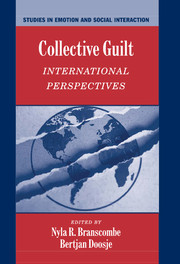Description
Collective Guilt
International Perspectives
Studies in Emotion and Social Interaction Series
Coordinators: Branscombe Nyla R., Doosje Bertjan
This book considers the nature of collective guilt, and the antecedent conditions necessary for it to be experienced.
Language: English
Subject for Collective Guilt:
Collective guilt: international perspectives
Publication date: 09-2004
356 p. · 15.2x22.9 cm · Hardback
Publication date: 09-2004
356 p. · 15.2x22.9 cm · Hardback
Collective guilt: international perspectives
Publication date: 09-2004
356 p. · 15.5x22.9 cm · Paperback
Publication date: 09-2004
356 p. · 15.5x22.9 cm · Paperback
Description
/li>Contents
/li>Biography
/li>
Emotion can result from interpreting group actions as reflecting on the self due to an association between the two. This volume considers the nature of collective guilt, the antecedent conditions necessary for it to be experienced, how it can be measured, as well as how collective guilt differs from other group based emotions. Research from Australia, Canada, Germany, Israel, the Netherlands, Northern Ireland, and the USA addresses critical questions concerning the who, when, and why of the experience of collective guilt. The political implications of collective guilt and forgiveness for the past are considered, and how those might depend on the national context. How collective guilt can be harnessed and used to create a more peaceful future for groups with a history of violence between then is emphasized.
Part I. Defining the Nature of Collective Guilt: 1. International perspectives on the experience of collective guilt Nyla R. Branscombe and Bertjan Doosje; 2. The measurement of collective guilt: what it is and what it is not Nyla R. Branscombe, Ben Slugoski and Diane M. Kappen; 3. The evocation of moral emotions in intergroup contexts: the distinction between collective guilt and collective shame Brian Lickel, Toni Schmader and Marchelle Barquissau; 4. Collective guilt in the United States: predicting support for social policies that alleviate social injustice Robyn Mallet and Janet Swim; 5. Gender inequality and the intensity of men's collective guilt Michael T. Schmitt, Nyla R. Branscombe and Jack W. Brehm; Part II. The Relationship between Group Identification and Collective Guilt: 6. Consequences of national in-group identification for responses to immoral historical events Bertjan Doosje, Nyla R. Branscombe, Russell Spears and Antony S. R. Manstead; 7. Refining the meaning of the 'collective' in collective guilt: harm, guilt, and apology in Australia Craig McGarty and Ana-Maria Bliuc; 8. Who feels guilty? Collective guilt, moral outrage, exonerating cognitions, group identification and personal values among Jewish-Israelis Sonia Roccas, Yechiel Klar and Ido Liviatan; 9. It depends on your point of view: implications of perspective taking and national identification for Dutch collective guilt Sven Zebel, Bertjan Doosje and Russel Spears; 10. Collective guilt, national identity, and political processes in Germany Lars Rensmann; Part III. Consequences for Intergroup Relations: 11. Intergroup forgiveness and guilt in Northern Ireland: social psychological dimensions of 'The Troubles' Miles Hewstone, Ed Cairns, Alverto Voci, Frances McLernon, Ulrike Niens and Masi Noor; 12. Intergroup reconciliation processes in Israel: theoretical analysis and empirical findings Arie Nadler and Ido Liviatan; 13. On whether to apologise to indigenous Australians: the denial of white guilt Martha Augoustinos and Amanda LeCouteur; 14. Racial wrongs and restitutions: the role of guilt and other group based emotions Aarti Iyer, Colin W. Leach and Anne Pedersen; 15. Importance of social categorization for forgiveness and collective guilt assignment for the Holocaust Michael J. A. Wohl and Nyla R. Branscombe; 16. Individual versus group rights in Western philosophy and the law Elazar Barkan; 17. A social psychological process perspective on collective guilt Nyla R. Branscombe.
Nyla R. Branscombe is Professor of Psychology at University of Kansas. She is well known in the field of Intergroup Relations, with more than 75 articles and chapters published. She has been co-recipient of several major research awards from the Society of Personality and Social Psychology and the Society for the Psychological Study of Social Issues.
Bertjan Doosje is Senior Lecturer at University of Amsterdam. His research has focused on group identification and its consequences for intergroup judgements. He currently serves on two journal editorial boards. He was co-recipient (with Branscombe) of the Society for the Psychological Study of Social Issues Otto Kleinberg award for Intercultural and Int. Relations prize in 1999.
Bertjan Doosje is Senior Lecturer at University of Amsterdam. His research has focused on group identification and its consequences for intergroup judgements. He currently serves on two journal editorial boards. He was co-recipient (with Branscombe) of the Society for the Psychological Study of Social Issues Otto Kleinberg award for Intercultural and Int. Relations prize in 1999.
© 2024 LAVOISIER S.A.S.




